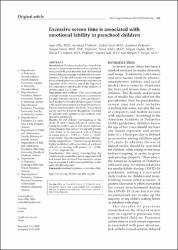Excessive screen time is associated with emotional lability in preschool children

View/
Access
info:eu-repo/semantics/openAccessDate
2021Author
Oflu, AyşeTezol, Özlem
Yalçın, Songül
Yıldız, Deniz
Çaylan, Nilgün
Foto Özdemir, Dilşad
Çiçek, Şeyma
Erat Nergiz, Meryem
Metadata
Show full item recordAbstract
Introduction. Previous studies have found that excessive screen time or early screen exposure is associated with poor attention, lack of behavioral control, delayed language and deficit in executive functions. The aim of this study was to investigate the relationship between screen time and emotion regulation skills, which is one of the important life components affecting the social relations of children aged 2 to 5 years. Population and methods. This cross-sectional descriptive study was carried out in a university hospital between January 1, 2018 and March 1, 2018. Mothers of healthy children aged 2-5 years with a daily screen time of less than 1 hour or over 4 hours were included in the study. A structured survey and the Emotion Regulation Checklist for parents were applied to the mothers who agreed to participate. Results. Of 240 children participating in the study, 98 (40.8 %) had >= 4 hours of screen time. Caring by mother, age at first screen exposure 12 months and older, notco-viewing with parents were found to be associated with >= 4 hours of screen time (p = 0.002, p = 0.002, p = 0.012, respectively). The ratio of participants with highlability/negativity (L/N) score was significantly higher in children with screen time of = 4 hours and not co-viewing with parents (p = 0.004, p = 0.033, respectively). Conclusions. This study investigating the relationship between the emotionregulation skill and screen time revealed that excessive screen time is associated with emotional lability in this early childhood period.















